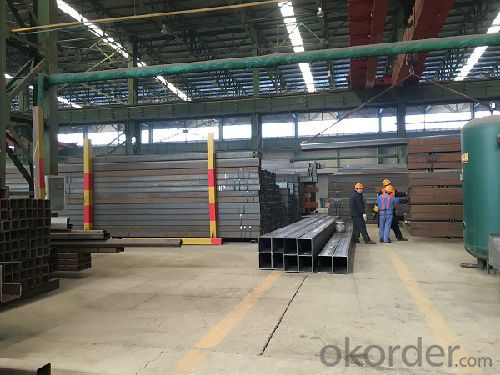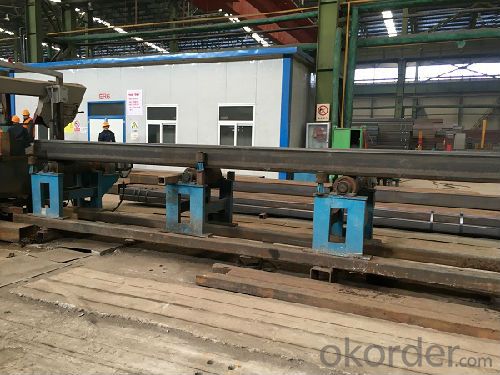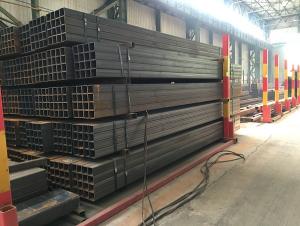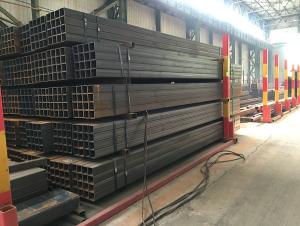Welded square rectangular tube for mechanism
- Loading Port:
- Tianjin
- Payment Terms:
- TT or LC
- Min Order Qty:
- 10 m.t.
- Supply Capability:
- 3500 m.t./month
OKorder Service Pledge
OKorder Financial Service
You Might Also Like
1、 Welded square rectangular tube for mechanism
Square tube, square tube is a kind of call and rectangular tube, is equal and not equal to the length of steel pipe. Is the strip through the process of processing roll system. In general is the strip through the demolition of the package, flat, curly, welded to form a circular tube, and then rolled into a square tube and then cut into a square tube and then cut into the required length.
2、 Welded square rectangular tube for mechanism
• High manufacturing accuracy
• High strength
• Small inertia resistance
• Strong heat dissipation ability
• Good visual effect
• Reasonable price
3、 Welded square rectangular tube for mechanism
Standard | GB, DIN, ASTM |
Grade | 10#-45#, 16Mn 10#, 20#, 45#, 16Mn |
Thickness | 1.5 - 25 mm |
Section Shape | Square and rectangular |
Outer Diameter | 20*20 mm-------400*400mm 20*30mm*300*500mm |
Place of Origin | Tianjin, China (Mainland) |
Length | 3-12M |
Outer Diameter | 20*20 mm-------400*400mm 20*30mm*300*500mm |
Grade | 235B 345B |
Standard | ASME, ASTM |
1) Material:(ASTM A 106/A53 GRB.API5LGRB,GB,235B,345B
2) Specification range:OD: 20*30mm----300*500mm 20*20 mm---400*400mm ,WT: 1.5 - 25 mm ,length:3-12m or according to the requirement of clients.
3) Excutive standards:GB,ASME API5L.ASTM A 106/A53,Despite of the above
4) Surface:black lacquered,varnish coating or galvanized.
5) Ends:Beveled or square cut ,painted.
6) Packing:bundles wrapped with strong steel strip,seaworthy packing.
4、Packaging & Delivery
Packaging Details: | seaworthy package,bundles wrapped with strong steel strip |
Delivery Detail: | 15-30days after received 30%TT |
5、 Welded square rectangular tube for mechanism
①How is the quality of your products?
Our products are manufactured strictly according to national and internaional standard, and we take a test
on every pipe before delivered out. If you want see our quality certifications and all kinds of testing report, please just ask us for it.
Guaranteed: If products’ quality don’t accord to discription as we give or the promise before you place order, we promise 100% refund.
②How about price?
Yes, we are factory and be able to give you lowest price below market one, and we have a policy that “ for saving time and absolutely honest business attitude, we quote as lowest as possible for any customer, and discount can be given according to quantity”,if you like bargain and factory price is not low enough as you think, just don’t waste your time.Please trust the quotation we would give you, it is professional one.
③Why should you chose us?
Chose happens because of quality, then price, We can give you both.Additionally, we can also offer professional products inquiry, products knowledge train(for agents), smooth goods delivery, exellent customer solution proposals.Our service formula: good quality+good price+good service=customer’s trust
SGS test is available, customer inspection before shipping is welcome, third party inspection is no problem.
6、 Welded square rectangular tube for mechanism


- Q:Can steel pipes be recycled after their useful life?
- Yes, steel pipes can be recycled after their useful life. Steel is a highly recyclable material, and old steel pipes can be melted down and repurposed to create new steel products. Recycling steel pipes helps conserve natural resources and reduces the environmental impact associated with mining and manufacturing new steel.
- Q:Can steel pipes be used for conveying sewage and wastewater?
- Yes, steel pipes can be used for conveying sewage and wastewater. Steel pipes are commonly used in sewage and wastewater systems due to their durability and strength. They are resistant to corrosion and can withstand high pressure and flow rates. Additionally, steel pipes are able to handle the harsh chemicals and contaminants present in sewage and wastewater without deteriorating or affecting the quality of the conveyed fluids. However, it is important to ensure that the steel pipes are properly coated or lined to prevent any potential corrosion or contamination issues. Regular maintenance and inspections are also necessary to identify and address any potential issues that could arise in the system.
- Q:Can steel pipes be used for scaffolding and support structures?
- Yes, steel pipes can be used for scaffolding and support structures due to their high strength, durability, and versatility. Steel pipes are capable of bearing heavy loads, providing stability and safety in construction projects. They are commonly used in the construction industry for scaffolding, temporary support structures, and as a framework for various building applications.
- Q:What is the lifespan of a steel pipe?
- The lifespan of a steel pipe can vary depending on several factors such as the quality of the steel used, the conditions it is exposed to, and proper maintenance. However, on average, a well-maintained steel pipe can last anywhere from 20 to 50 years.
- Q:Can steel pipes be used for pharmaceutical manufacturing?
- Yes, steel pipes can be used for pharmaceutical manufacturing. Steel pipes are commonly used in various industries, including pharmaceutical manufacturing, due to their durability, strength, and resistance to corrosion. In pharmaceutical manufacturing, steel pipes are primarily used for fluid transportation, such as the transfer of chemicals, solvents, and other raw materials. They are also used for the distribution of process water, steam, and other utilities. Stainless steel pipes are particularly preferred in pharmaceutical manufacturing as they are highly resistant to corrosion and can withstand high temperatures and pressures. Moreover, stainless steel pipes have smooth surfaces, which prevent the accumulation of particles and facilitate easy cleaning and sterilization, essential requirements in pharmaceutical production. Overall, steel pipes are a reliable and suitable option for pharmaceutical manufacturing due to their robustness, resistance to corrosion, and ability to meet the stringent cleanliness and hygiene standards of the industry.
- Q:Can steel pipes be used for transporting liquids and gases?
- Yes, steel pipes can be used for transporting liquids and gases. Steel pipes are commonly used in various industries, such as oil and gas, water supply, and chemical processing, due to their durability, strength, and resistance to corrosion. They are capable of safely and efficiently transporting a wide range of liquids and gases over long distances.
- Q:Can steel pipes be used in extremely cold temperatures?
- Yes, steel pipes can be used in extremely cold temperatures. Steel is known for its strength and durability, making it suitable for various applications, including in extreme cold weather conditions. Steel pipes have a high resistance to low temperatures and can withstand the effects of freezing temperatures without losing their structural integrity. This makes them ideal for use in industries such as oil and gas, where they are exposed to sub-zero temperatures. Additionally, steel pipes can be insulated or coated to provide further protection against the cold and prevent any potential issues, such as freezing or cracking. Overall, steel pipes are a reliable choice for use in extremely cold temperatures.
- Q:Can steel pipes be used for sewage treatment plants?
- Yes, steel pipes can be used for sewage treatment plants. Steel pipes are commonly used in sewage treatment plants due to their durability, strength, and resistance to corrosion. They are suitable for transporting sewage, wastewater, and other fluids in these facilities.
- Q:How are steel pipes used in the construction of wind farms?
- Steel pipes are used in the construction of wind farms for various purposes, such as supporting wind turbine towers, providing a strong foundation for the turbines, and transmitting electricity generated by the turbines to the power grid.
- Q:What are the advantages of using steel pipes in construction projects?
- There are several advantages of using steel pipes in construction projects. Firstly, steel pipes are incredibly strong and durable. They have a high tensile strength, which means they can withstand heavy loads and pressures without deforming or breaking. This makes them ideal for applications where structural integrity is crucial, such as in the construction of buildings, bridges, and infrastructure. Secondly, steel pipes have excellent resistance to corrosion. They are typically coated with protective layers, such as galvanized zinc or epoxy, which prevent rusting and extend their lifespan. This makes steel pipes suitable for both aboveground and underground applications, including water and sewage systems, oil and gas pipelines, and industrial processing plants. Additionally, steel pipes offer great versatility in terms of shape and size. They can be manufactured in various diameters and thicknesses, allowing for customization to meet specific project requirements. This flexibility in design makes steel pipes suitable for a wide range of applications in construction, including plumbing, HVAC systems, and structural supports. Moreover, steel pipes are relatively easy to install and maintain. They can be welded, threaded, or bolted together, providing a secure and leak-proof connection. This ease of installation reduces construction time and labor costs. Furthermore, steel pipes require minimal maintenance, as they are resistant to cracking, chipping, and warping. This makes them a cost-effective choice over the long term. Lastly, steel pipes are environmentally friendly. They are 100% recyclable, meaning they can be reused and repurposed without losing their structural integrity. Recycling steel pipes reduces the need for new raw materials and minimizes waste generation, making them a sustainable option for construction projects. Overall, the advantages of using steel pipes in construction projects include their strength, corrosion resistance, versatility, ease of installation and maintenance, and environmental sustainability. These qualities make steel pipes a reliable and cost-effective choice for a wide range of applications in the construction industry.
1. Manufacturer Overview |
|
|---|---|
| Location | |
| Year Established | |
| Annual Output Value | |
| Main Markets | |
| Company Certifications | |
2. Manufacturer Certificates |
|
|---|---|
| a) Certification Name | |
| Range | |
| Reference | |
| Validity Period | |
3. Manufacturer Capability |
|
|---|---|
| a)Trade Capacity | |
| Nearest Port | |
| Export Percentage | |
| No.of Employees in Trade Department | |
| Language Spoken: | |
| b)Factory Information | |
| Factory Size: | |
| No. of Production Lines | |
| Contract Manufacturing | |
| Product Price Range | |
Send your message to us
Welded square rectangular tube for mechanism
- Loading Port:
- Tianjin
- Payment Terms:
- TT or LC
- Min Order Qty:
- 10 m.t.
- Supply Capability:
- 3500 m.t./month
OKorder Service Pledge
OKorder Financial Service
Similar products
New products
Hot products
Related keywords































